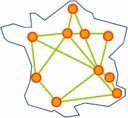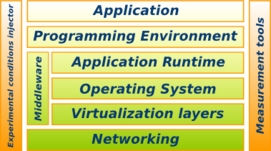Grid5000:Home
ALADDIN-G5K : ensuring the development of Grid'5000for the 2008-2012 periodAn infrastructure distributed in 9 sites around France, for research in large-scale parallel and distributed systems Engineers ensuring the development and day to day support of the infrastructure are mostly provided by Inria, under the ADT ALADDIN-G5K initiative. |
Latest newsGrid'5000 under extension to Porto Alegre, BrazilJuly 21st, 2009, INRIA and UFRGS signed a Memorandum of Understanding marking the cooperation of the two institutes towards the extension of the Grid'5000 platform to Brazil. According to the terms of this memo, UFRGS will contribute to Grid'5000 by operating a local site in Porto Alegre and INRIA will fully integrate this local site into Grid'5000 in order to gain an international scale. Researchers from both partners will therefore gain access to one of the major scientific instruments for the study of large-scale parallel and distributed problems in computer science. With this cooperation, Grid'5000 gives its users the possibility to study the effects of inter-continental networks links on these problems. For Grid'5000 users, access to the new site during the integration phase is possible using portoalegre.grenoble as name of the new site Latest updated experiment descriptions{{#experiments:3}} Latest updated publicationsFive random publications that benefited from Grid'5000 (at least 2937 overall):
Second Grid'5000 award given to Lucas NussbaumDuring Grid'5000 Spring School 2009, Lucas Nussbaum was given the second Grid'5000 award, in recognition of his outstanding contribution to ALADDIN / Grid'5000. Grid'5000 spring school now finishedThe Grid'5000 spring school took place between April 7, 2009 and April 10, 2009 in Nancy. The presentation program is updated with the slides of the presentations as they come in. Most practical sessions are available to people that did not take part during the school. Here and there (pdf) you can read local press coverage. In addition to the second Grid'5000 award given to Lucas Nussbaum for his outsanding contribution to Grid'5000, 3 awards were given for presentation made during the event :
|
Grid'5000 at a glance
- Grid'5000 project aims at building a highly reconfigurable, controlable and monitorable experimental Grid platform gathering 9 sites geographically distributed in France featuring a total of 5000 processors:
Sites:
- The main purpose of this platform is to serve as an experimental testbed for research in Grid Computing.
- This project is one initiative of the French ACI Grid incentive (see below: Funding Institutions) which provides a large part of Grid'5000 funding on behalf of the French Ministry of Research & Education.
- Grid'5000 is a research effort developping a large scale nation wide infrastructure for Grid research.
- 17 laboratories are involved, nation wide, in the objective of providing the community of Grid researchers a testbed allowing experiments in all the software layers between the network protocols up to the applications.
The current plans are to assemble a physical platform featuring 9 local platform (at least one cluster per site), each with 100 to a thousand PCs, connected by the RENATER Education and Research Network.
All clusters will be connected to Renater with a 10Gb/s link (or at least 1 Gb/s, when 10Gb/s is not available yet).
This high collaborative research effort is funded by the French ministry of Education and Research, INRIA, CNRS, the Universities of all sites and some regional councils.
Rationale
The foundations of Grid'5000 have emerged from a thorough analysis and numerous discussions about methodologies used for scientific research in the Grid domain. A report presents the rationale for Grid'5000.
In addition to theory, simulators and emulators, there is a strong need for large scale testbeds where real life experimental conditions hold. The size of Grid'5000, in terms of number of sites and number of processors per site, was established according to the scale of the experiments and the number of researchers involved in the project.







